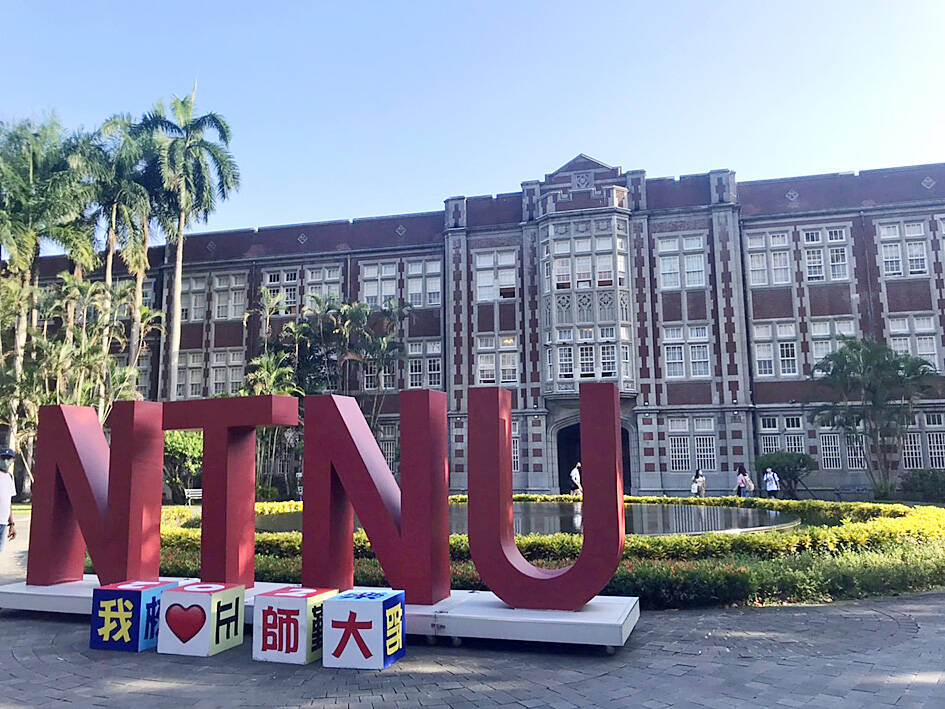As Taiwan’s #MeToo movement continues, more accusations of sexual harassment have been made against people in the fields of academia, politics and entertainment.
In response to accusations made against National Taiwan Normal University’s (NTNU) Department of Graphic Arts and Communications associate professor Chiu Yu-ping (邱于平), the university yesterday said it received new evidence and has relaunched an investigation, while a gender equity committee meeting would be held this month.
Chiu was accused of rubbing the neck, shoulders, lower stomach and hips of female students in his office, as well as putting his hand inside their clothes to touch their bra straps.

Photo: Yang Mien-chieh, Taipei Times
This led to one of the students being afraid of walking to the department building alone, and seeking psychiatric help and anxiety medication, the university said.
The case was reported to NTNU’s gender equity committee on Dec. 2 last year, and an official application for an investigation was filed on Dec. 19 last year.
One of the students said that after the university’s first investigation, it in April recommended that the department suspend Chiu from teaching required courses and his position as a mentor teacher.
However, he was still allowed to teach elective courses this semester, which could have led to more assault cases, she said, adding that students petitioned for a reinvestigation.
NTNU said it would carefully look into the claims, according to the principle of the presumption of innocence until proven guilty, but not letting the guilty off the hook, to ensure students have a safe learning environment on campus.
Meanwhile, several female students launched an online page for alleged victims of former National Taiwan University (NTU) sociology assistant professor Lee Ming-tsung (李明璁) to gather, as they accused him of having romantic relations with students.
The NTU Department of Sociology yesterday said it had reported the claims to the university’s gender equity committee.
Lee wrote on Facebook that he had not used his position of power as a professor to form imbalanced relationships, but due to public concerns, he would resign from his teaching duties.
Separately, a woman who said she worked in Taiwan People’s Party (TPP) Legislator Lai Hsiang-ling’s (賴香伶) office on Saturday wrote on Facebook that TPP Legislator Chiu Chen-yuan (邱臣遠) had sexually harassed her.
Chiu “placed his hand on my left hand, which was on my thigh,” she said.
Lai was present at the time, but did not stop him or deal with his behavior, she said.
Chiu responded on Facebook yesterday, saying that he does not know the woman, and that he has always abided by principles of workplace gender equality and never stepped over the line.
He said he would reserve the right to take legal action for alleged defamation.
Lin wrote on Facebook yesterday that the woman seemed to be a Social Democratic Party member, and that her sexual harassment allegation was a smear campaign against the TPP.
A lawyer yesterday said that if the woman is a victim of sexual harassment, that Lai revealed her identity could be considered a contravention of the Sexual Harassment Prevention Act (性騷擾防治法).
Also yesterday, actor Chris Wang (宥勝) apologized on Facebook after two members of staff accused him of having sexually harassed them, including licking ears, taking off their bras, embracing them and rubbing their chests.
Additional reporting by Lee Shao-ling

An essay competition jointly organized by a local writing society and a publisher affiliated with the Chinese Communist Party (CCP) might have contravened the Act Governing Relations Between the People of the Taiwan Area and the Mainland Area (臺灣地區與大陸地區人民關係條例), the Mainland Affairs Council (MAC) said on Thursday. “In this case, the partner organization is clearly an agency under the CCP’s Fujian Provincial Committee,” MAC Deputy Minister and spokesperson Liang Wen-chieh (梁文傑) said at a news briefing in Taipei. “It also involves bringing Taiwanese students to China with all-expenses-paid arrangements to attend award ceremonies and camps,” Liang said. Those two “characteristics” are typically sufficient

A magnitude 5.9 earthquake that struck about 33km off the coast of Hualien City was the "main shock" in a series of quakes in the area, with aftershocks expected over the next three days, the Central Weather Administration (CWA) said yesterday. Prior to the magnitude 5.9 quake shaking most of Taiwan at 6:53pm yesterday, six other earthquakes stronger than a magnitude of 4, starting with a magnitude 5.5 quake at 6:09pm, occurred in the area. CWA Seismological Center Director Wu Chien-fu (吳健富) confirmed that the quakes were all part of the same series and that the magnitude 5.5 temblor was

The brilliant blue waters, thick foliage and bucolic atmosphere on this seemingly idyllic archipelago deep in the Pacific Ocean belie the key role it now plays in a titanic geopolitical struggle. Palau is again on the front line as China, and the US and its allies prepare their forces in an intensifying contest for control over the Asia-Pacific region. The democratic nation of just 17,000 people hosts US-controlled airstrips and soon-to-be-completed radar installations that the US military describes as “critical” to monitoring vast swathes of water and airspace. It is also a key piece of the second island chain, a string of

The Central Weather Administration has issued a heat alert for southeastern Taiwan, warning of temperatures as high as 36°C today, while alerting some coastal areas of strong winds later in the day. Kaohsiung’s Neimen District (內門) and Pingtung County’s Neipu Township (內埔) are under an orange heat alert, which warns of temperatures as high as 36°C for three consecutive days, the CWA said, citing southwest winds. The heat would also extend to Tainan’s Nansi (楠西) and Yujing (玉井) districts, as well as Pingtung’s Gaoshu (高樹), Yanpu (鹽埔) and Majia (瑪家) townships, it said, forecasting highs of up to 36°C in those areas